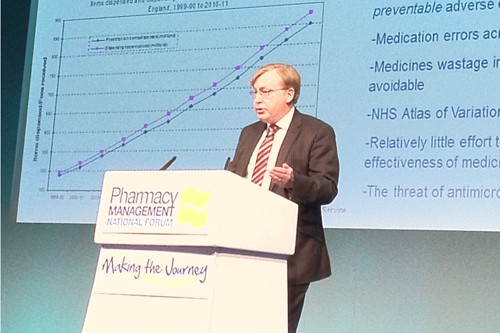
The UK pharmaceutical industry will have a key role to play in the government drive towards ‘medicines optimisation’, according to the chief pharmaceutical officer.
Keith Ridge said the patient outcome-focused concept, which centres around getting better value from medicine use, “is now central to government policy”.
“The pharmaceutical industry, in its broadest sense, has an absolutely key role to play in this as a partner,” he told the Pharmacy Management National Forum last week.
“It will be core business for the NHS Commissioning Board and I really hope it will be core business for NHS clinical professionals and for the pharmaceutical industry too.”
He added: “The pharmaceutical industry is a key partner to the success of medicines optimisation.”
But it’s pharmacy and others in the NHS that the government will be asking to make the concept a reality.
It follows on from medicines management, a programme widely viewed as focused on cutting prescribing costs, but Ridge was clear that medicines optimisation will not be “medicines management re-packaged”.
“As David Nicholson said, medicines optimisation is a much more sophisticated model of best value, quality and outcomes for patients and the public. It will bring a much more rapid understanding of where a medicine fits – particularly as medicines systems are reoriented towards outcomes,” he said.
The NHS spent £12.9bn on medicines in 2010-11, but 30-50 per cent of medicines are not taken as intended and ten days after starting a new medicine, 30 per cent of patients are non-adherent.
While Ridge was clear that prescribing medicines is “rightly a significant chunk of healthcare spending”, he said productivity and innovation in healthcare “has to increase markedly” if the health system is to cope with the current economic climate.
The application of medicines optimisation will go hand-in-hand with a review of local formularies, one of the recommendations contained in the government’s Innovation, Health and Wealth (IHW) plan.
In August, Ridge wrote to chief pharmacists in England and the pharmacy and prescribing leads of strategic health authorities to “strongly encourage” them to review local formulary processes to begin implementation of the IHW actions.
One of these is for all NICE technology appraisal recommendations to be incorporated automatically into relevant local NHS formularies, in a planned way that supports safe and appropriate clinical practice.
As a further part of the plans, Ridge wants Drug and Therapeutics Committees and formularies to be “reoriented” to focus “much more about quality, outcomes and value”, he told the Pharmacy Management National Forum.
“There will also be a process to help people track where they are in the process of adoption of NICE technology appraisals in the formulary, and that will be required to be published alongside the formularies.”
From April 1, 2013, there will be a new requirement for all local formularies to be published.
“At a local level formularies are an important part of medicines infrastructure, but they have to change,” Ridge said. “They have to become part of the medicines optimisation structure.”




